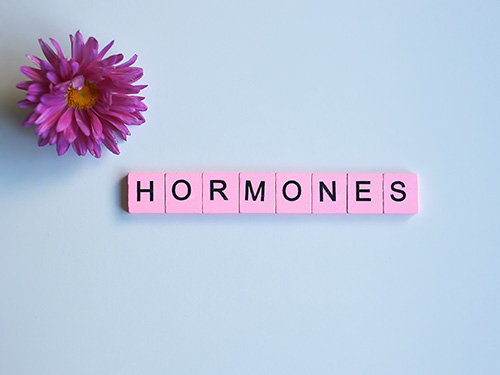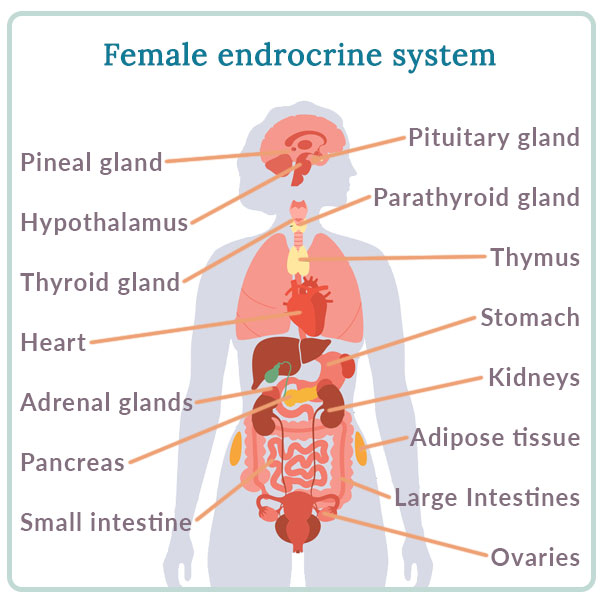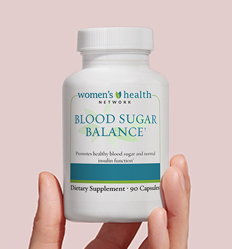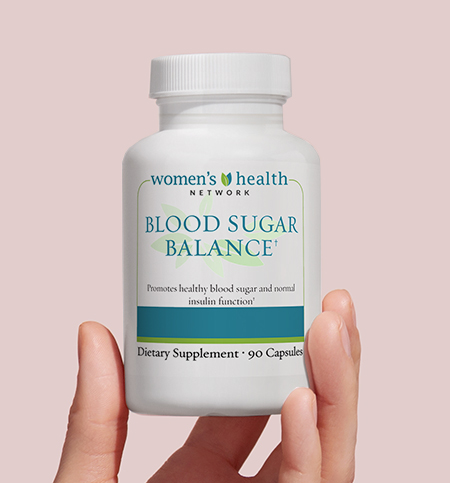Reviewed by Dr. Mary James, ND
Endocrine disorders or endocrine imbalances can wreak symptom-havoc on women, threatening their health and well-being on a daily basis. While some disorders are more serious than others, all of them have the potential to derail your life.
Your wider endocrine system is a web of individual but interconnected hormone systems so problems in one area can easily cause issues in another. From diabetes, adrenal disorders and imbalances, and thyroid imbalances, to PCOS, fertility problems, and osteoporosis, any endocrine disorder should be identified and addressed as soon as possible so that you can maintain control over your life, and your future.

Once you know what kind of endocrine issue you’re dealing with, your treatment options will be much clearer. That information alone can be a huge relief. You may have heard about some of these common endocrine disorders, and others may be new to you.
Either way, the more you know, the better informed you’ll be going forward.
Diabetes
Diabetes (mellitus) directly affects how your body uses glucose for energy. Glucose is the only kind of fuel your brain uses, and once it’s in your system, it’s called blood glucose, or blood sugar. For survival, your body must maintain the perfect blood sugar balance. Under normal conditions, your pancreas produces insulin, a hormone that carries glucose into the cells where it is turned into energy.
But with diabetes, there’s a problem with insulin that results in too much glucose circulating in your blood. If the pancreas doesn’t make enough insulin, or if the cells can’t take up the glucose, they starve. Genetics plays a role in all forms of diabetes. Nearly half the US population already has diabetes or is on the path to developing it.
There are several kinds of diabetes:
1. Type 1 diabetes — either your immune system destroys the insulin-producing “beta” cells in your pancreas, or the beta cells die when the pancreas is injured or becomes diseased. Type 1 diabetes is not preventable — at least not yet — and is treated with frequent insulin injections and careful food management. Blood glucose must be tested regularly to make sure the all-important blood sugar balance is maintained.
2. Type 2 diabetes — either your body doesn’t respond to insulin (insulin resistance) or eventually ends up not making enough insulin to do the job. Type 2 can often be managed with diet and lifestyle changes but insulin injections may be needed later on if the situation doesn’t improve and pancreatic function has deteriorated.
3. Prediabetes — blood sugar levels are too high — though not yet to the level of diabetes — and your body doesn’t use insulin well. This condition can usually be controlled with dietary adjustments, weight loss and exercise.
4. Gestational diabetes — during pregnancy, the placenta produces hormones that make cells insulin-resistant. If the pancreas can’t make enough extra insulin, blood sugar levels rise too high. It’s usually treated with special meals and scheduled exercise, and may resolve after delivery, though many women who have it end up with type 2 diabetes later in life.
You can keep an eye on your blood sugar levels with the help of your doctor. If your numbers begin to trend upward, you’ll know you need to take action right away. Steps include diet and possibly, supplements, and lifestyle alterations that help maintain healthy blood sugar balance. Still, you just have to take these steps seriously.

Adrenal disorders and imbalances
Your adrenal glands ensure your survival every day with the hormones they make, and cortisol is one of them. Cortisol drives your heart, blood pressure, immune health, nervous system and metabolism. But you can still have problems if cortisol levels get too high — or too low.
Though they’re still rare, the most common adrenal disorders are:
1. Tumors in the adrenal glands or other areas — these are almost always non-cancerous, but can still cause damage, symptoms, and serious health effects.
2. Cushing’s syndrome — this can develop when there is too much cortisol due to a tumor in one of the adrenal glands or somewhere else in the endocrine network. It can also develop with excessive/prolonged use of steroids. Cushing’s is treated with medication.
3. Congenital adrenal hyperplasia (CAH) — this genetic disorder prevents the adrenal glands from making their key hormones while also increasing production of male sex hormones (androgens). CAH often occurs alongside other hormonal imbalances and is treated with daily medications.
4. Addison’s disease — this autoimmune disease occurs when your adrenals don’t make enough cortisol, or another natural steroid hormone, aldosterone. It can damage the adrenal glands and is treated with hormone medication.
Subclinical cortisol imbalances can still have a radical effect on how you feel every day. Non-drug protocols and lifestyle measures can help with early adrenal imbalance symptoms that may include anxiousness, insomnia, fatigue, cravings and irritability.
Thyroid disorders
For such a tiny gland, your thyroid has a lot of jobs involving all the metabolic processes in your body. By far the most common problems involve thyroid hormone production. There’s either too much or too little, or there’s another kind of problem related to one or the other.
Common thyroid problems include:
1. Hyperthyroidism — this is the overproduction of thyroid hormones and it has several subsets:
- Graves’ disease — the body produces too much thyroid hormone.
- Toxic adenoma — nodules within the thyroid secrete extra hormone.
- Subacute thyroiditis — if the thyroid is inflamed, it can cause excess hormone output; this is usually a temporary condition.
- Pituitary irregularities or thyroid growths — these can sometimes result in hyperthyroidism.
2. Hypothyroidism — this results when the thyroid doesn’t make enough of its hormones or there is a problem converting thyroid hormone into the form used by the body. There are several potential causes:
- Hashimoto’s thyroiditis — this autoimmune disorder can destroy thyroid cells over time.
- Thyroid removal — surgical removal or chemical destruction of the thyroid gland may be necessary in certain cases: cancer (very rare), radiation, injury or some types of hyperthyroidism.
- Overexposure to certain substances — these include iodide, some sinus medications, the heart medication amiodarone, and lithium.
Often, just getting a diagnosis is the first step to resolving thyroid issues. Unfortunately, women’s thyroid imbalances are notorious for being “under the radar” of many conventional thyroid hormone tests — and may be labeled as “subclinical.”
With low or sluggish thyroid, women experience difficult symptoms, like loss of energy, hair and skin changes, and weight gain. Diet and lifestyle changes, along with specific nutritional supplementation can help restore thyroid balance and resolve symptoms.
PCOS — Polycystic ovary syndrome
PCOS is a serious hormonal imbalance usually characterized by small ovarian cysts. The cysts themselves aren’t a threat but they can be associated with improper ratios between the reproductive hormones, and often, infertility. Women with PCOS often also have a problem using insulin that can turn into insulin resistance or — eventually — diabetes. PCOS symptoms include irregular or absent periods, acne, hair loss, body hair growth, cravings and depression.
Genetics are thought to be a factor in PCOS, which is usually treated with regular exercise, diet changes, weight control, and sometimes birth control pills.

Osteoporosis
Osteoporosis may not seem like a hormonal disorder, but it often has an endocrine component. For women, the links between hormones and osteoporosis are continuing to be revealed by research:
1. Osteoporosis and menopause — estrogen is thought to protect against osteoporosis in general, so when levels drop off in menopause — especially if it’s early or surgically-induced — the hormonal changes vastly increase the risk of losing excess bone.
2. Osteoporosis and PMS — menstrual issues, including PMS and irregular periods, are “two of the first signs” of hormonal imbalance that can lead to increased bone loss later, according to Dr. Sarika Arora, MD. This kind of hormonal imbalance can be caused by too much estrogen and/or too little progesterone. High levels of the adrenal hormone cortisol can decrease progesterone levels.
3. Osteoporosis and thyroid (and parathyroid) hormone overproduction — if your body makes too much thyroid hormone or parathyroid hormone (hyperparathyroidism), calcium will be stolen from the bones and pulled into the blood, leading to thinning bone.
4. Osteoporosis and hormone-like glucocorticoids — long-term use of anti-inflammatory, glucocorticoid medications, like prednisone, can lead to bone loss.
Osteoporosis is often accompanied by noticeable signs of bone loss, including receding gums, weak fingernails, decreased grip strength and muscle aches and pains. But bone tissue can be very resilient under the right conditions. So even if you get a late start with diet and lifestyle improvements, you can often stabilize your bone health and stop losing bone tissue without drugs.
Hormonal health is critically important for your overall wellness
By now, you’re getting the idea that your endocrine system and its hormones touch every function in your body. Every day it does thousands of things right and you don’t even notice. And of course, that’s a good thing.
To maintain hormonal health, it’s important to pay close attention to your body and how you feel every day. If you begin to notice symptoms or feel like something is “off,” you may actually be picking up on the subtle signs that your hormonal health is beginning to shift.
Taking action early can help you head off worse problems down the line.
https://www.mayoclinic.org/diseases-conditions/diabetes/basics/definition/con-20033091
https://www.webmd.com/diabetes/type-1-diabetes-guide/type-1-diabetes
https://www.forbes.com/sites/robertglatter/2015/09/08/50-percent-of-adults-in-u-s-have-diabetes-or-pre-diabetes-study-finds/#404925cf16f4
https://www.mayoclinic.org/diseases-conditions/type-2-diabetes/home/ovc-20169860
https://www.endocrineweb.com/conditions/pre-diabetes/pre-diabetes
https://www.mayoclinic.org/diseases-conditions/diabetes/basics/complications/con-20033091
https://www.diabetes.org/diabetes-basics/gestational/how-to-treat-gestational.html
https://www.nichd.nih.gov/health/topics/adrenalgland/conditioninfo/Pages/types/
https://www.healthline.com/health/cushing-syndrome
https://medlineplus.gov/addisondisease.html
https://www.webmd.com/women/guide/understanding-thyroid-problems-basics#1
https://www.webmd.com/women/tc/polycystic-ovary-syndrome-pcos-topic-overview#2
https://theendocrineclinic.com/condition/osteoporosisCalcium.htm
/pms-and-menstruation/irregular-periods-and-bone-health/
https://www.froedtert.com/endocrinology/osteoporosis


















